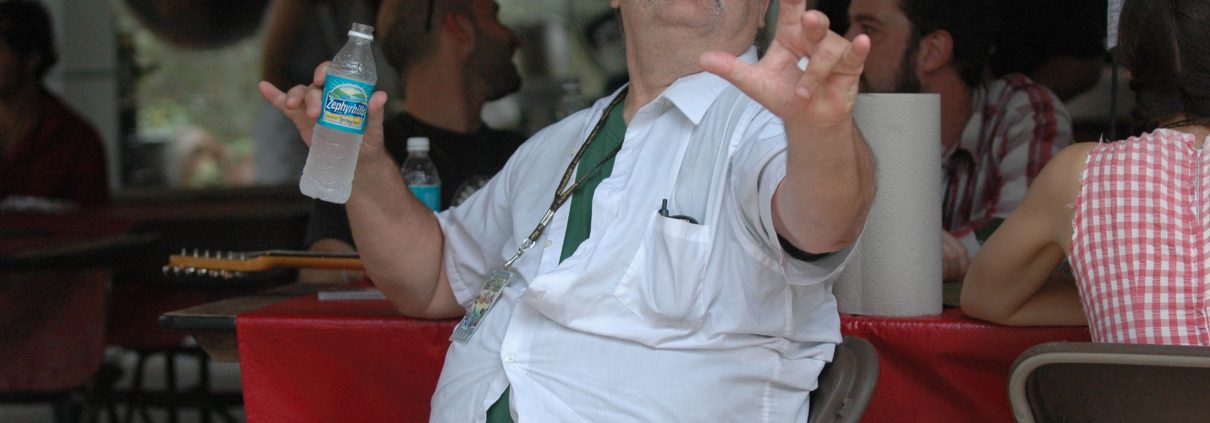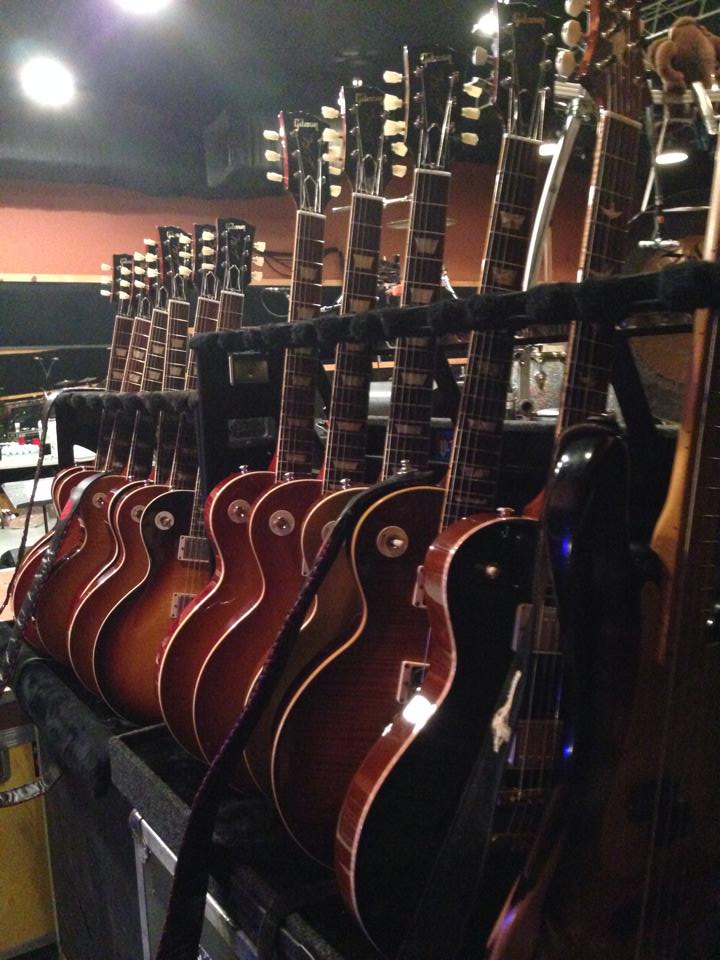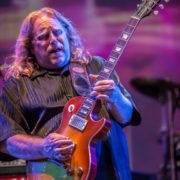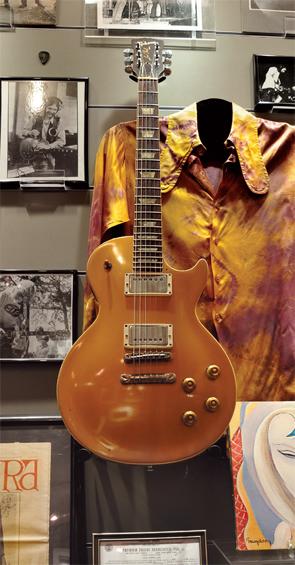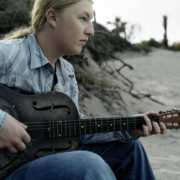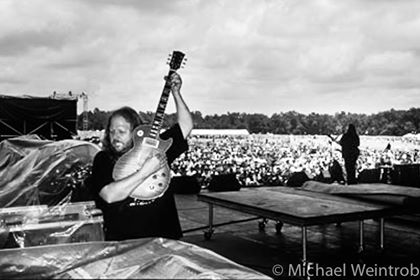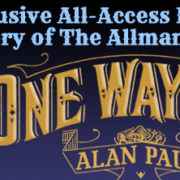RIP Col. Bruce – A Tribute to a Friend and Genius
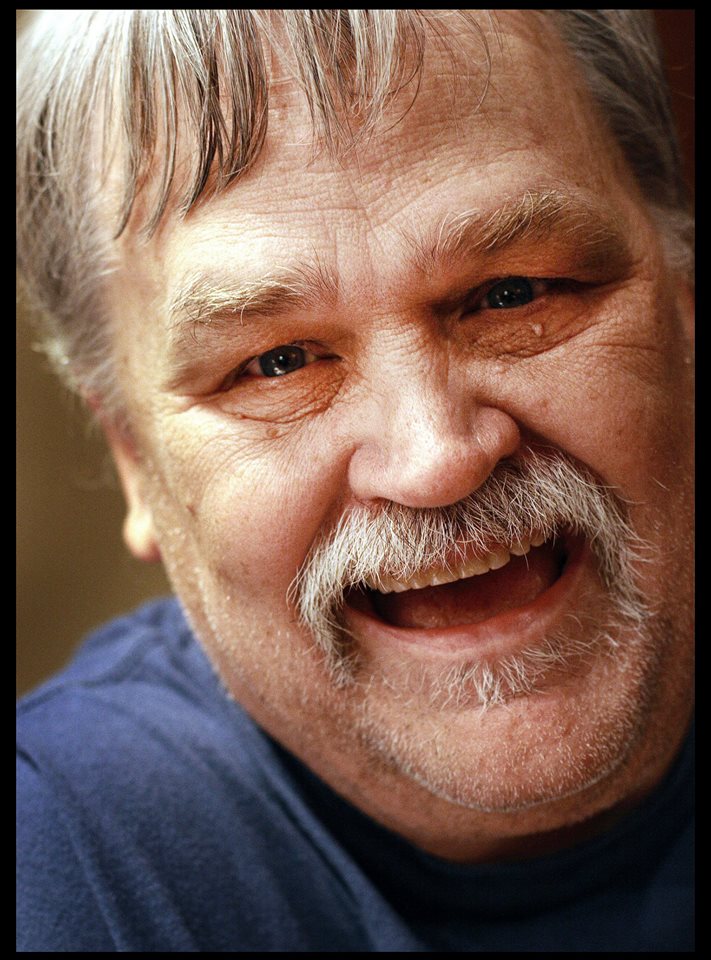
Photo – Jess Burbridge
Oteil Burbridge: “If you’re lucky enough, you’ll meet someone who will show you the impossible over and over again until one day you find yourself doing things you never thought you possibly could. Without him there would be no Oteil in the Allman Brothers Band or Dead & Co. There would be no Oteil From Egypt. He changed the entire trajectory of my life. He literally ‘changed my mind.’”
“Obituary writer for musicians I knew and loved” is a job I neither sought nor desired. And yet…
I went to bed last night texting with Kirk West, who was sending me reports from the massive 70th birthday tribute concert to our mutual friend, Col. Bruce Hampton at Atlanta’s Fox Theatre, featuring Warren Haynes, Derek Trucks, Susan Tedeschi and dozens of others. I wasn’t there because I had been in DC for the WH Correspondents Jam. Kirk was sending me messages like, “Derek, Warren and Chuck just blew the roof off this place with Schools and Duane Trucks.” And “Bruce played 20 minutes and has been sitting side of the stage grinning like mad.”
I went to bed smiling at all this and woke up to news that Bruce was dead, after collapsing during an all-hands-on-deck “Lovelight” finale. I am, of course, shocked, and am writing this in a bit of a daze.
A few years ago, I wrote a Relix appreciation of Bruce and his fabulous Aquarium Rescue Unit, the band that spawned Jimmy Herring, Oteil Burbridge and, essentially, Derek Trucks and Widespread Panic. It is below and if you don’t know anything about Bruce, you should probably start there. I’m in a more reflective, personal mood right now and am going to share some impressionistic memories of our interactions.
Some of you may remember Bruce from Sling Blade, where he had a brief but memorable role. I met Billy Bob Thornton and discussed it with him on Friday. I do believe he was there last night.
His death has gotten more publicity than it otherwise would because it happened on stage in front of thousands. He was surrounded by musicians who loved and respected him, including quite a few, like Warren, Derek, Susan and Taz, who matter to me. Matter to me as people, not just musicians or public figures. The ghoulishness of a lot of the interest and sharing of what is really a painful video makes me sick. Please consider that. These are real people who experienced something emotionally traumatic. They are not props there for the amusement of websites and publications who had no fucking idea who Bruce Hampton was. With that off my chest…
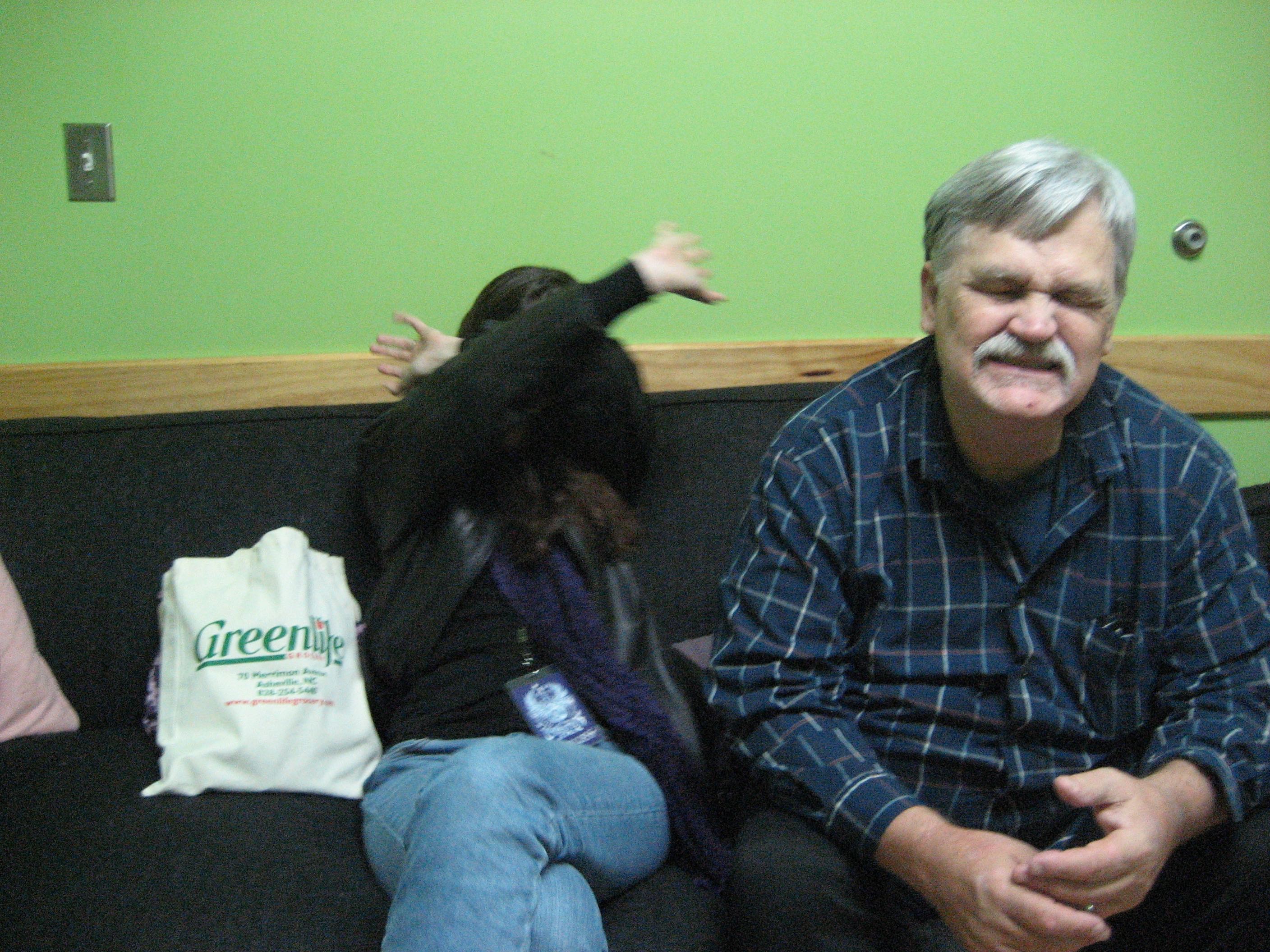
Foto – Kirk West. Mr. and Mrs. Hampton at XMas Jam 2007. This one captures it all.
Bruce was one of the greatest truth tellers I’ve ever known. Quite a few times over the years, a conversation with him clarified my thinking about a position or shifted my perception about a person or a situation.
Yet he could talk shit with the best of them. He would spin elaborate tales that teetered very close to believability and deliver them earnestly, with a sense of awe and raised eyebrows that really made you wonder. He briefly had me convinced that Big Head Todd was a Golden Child who had been smuggled out as a baby to be raised in anonymity in suburban Colorado until he could take his rightful place on the throne. He told me that in the Wetlands dressing room, before he performed. I had been telling him about a dim sum lunch with Todd, Kirk West and a bunch of others that afternoon. I knew it was bullshit… and yet I wondered.
Bruce spun a lot of tales like this. Think Big Fish. So when I heard about his death and the circumstances around it, I couldn’t help but feel a tinge of awe mixed in with my sadness. He couldn’t have written a more dramatic climax. He died in the middle of his own memorial service. It felt like a story he would have told about a fabled bluesman, filled with enough concrete details to pull you along.
“So Blind Willie lived his life in commercial obscurity – he was a railroad porter for 52 years – but he had a huge following of musicians who revered him. Famous musicians. Big names. Big stars. They all bowed to Blind Willie. On his 70th birthday they threw him the greatest concert the world had ever seen on the stage of a sold-out Carnegie Hall. For the first time, he understood what his music had meant to the world.
“And on the final number, with all his acolytes on stage, ol’ Willie collapsed and died, with a big smile on his face. Some say you could see an angel rise to heaven. And right at that moment, the biggest shooting star anyone had ever seen lit up the Southern sky.”
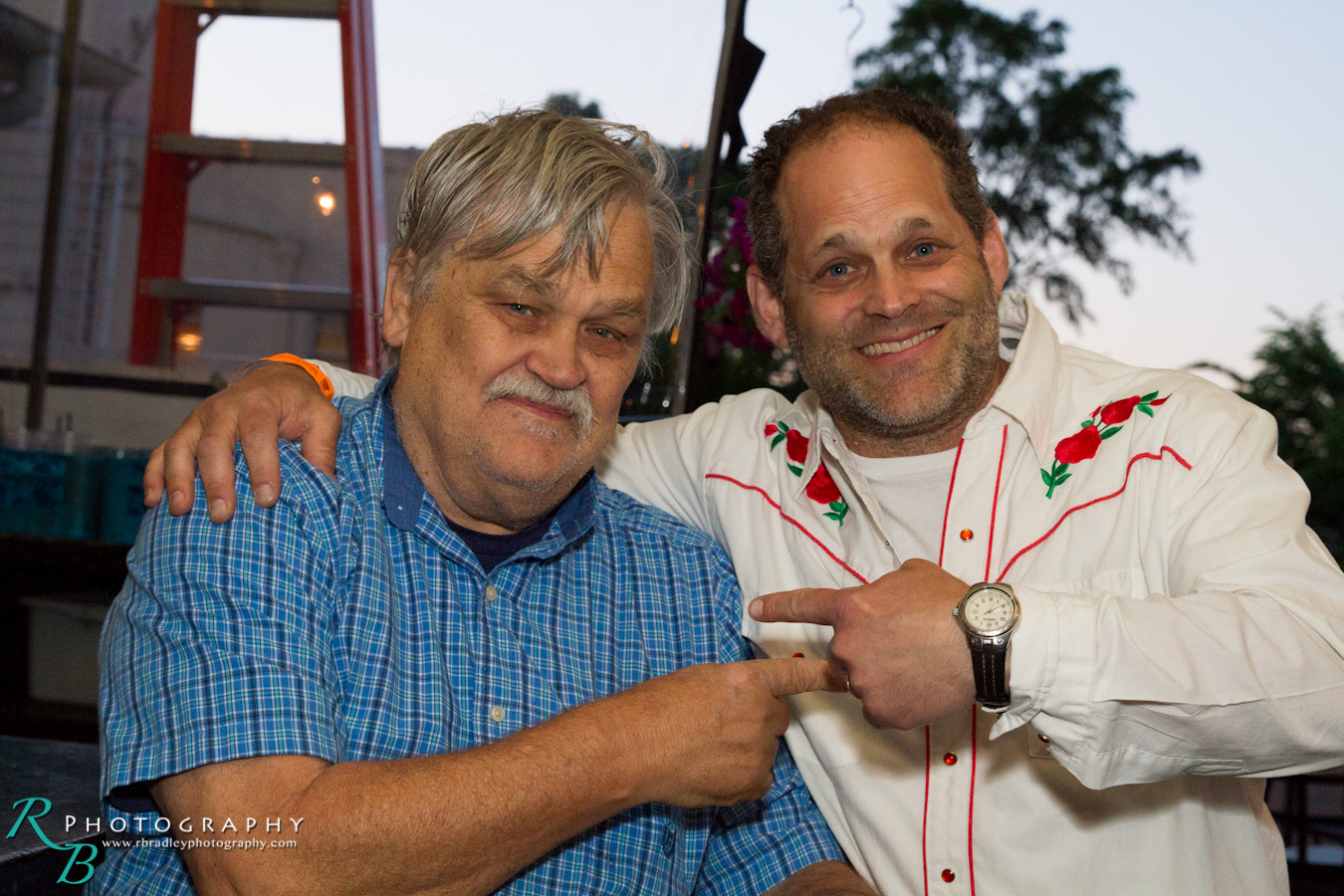
The Colonel and me, Eddie’s Attic, 5-15-14. Photo by Rhiannon Bradley.
…Bruce and I hit it off immediately after meeting in 1991. I began writing about him and the ARU as often as I could manage in Guitar World. I made sure a picture of him was the dominant image in my story in the 1992 HORDE tour and I believe that I was the first writer to cover them in a national publication. Bruce was very appreciative of all this, but basically we just liked each other. We began talking on the phone occasionally, and I’d go hang whenever he passed through New York.
…Then Bruce left the road, saying his health was too poor to keep on pounding one nighters. I moved to Ann Arbor. Bruce started doing some more limited road work Another version of the HORDE tour was coming to Detroit and Bruce and the Fiji Mariners were on it. I made my way backstage, searched buses until I found Bruce and sat down for a nice long catch-up talk while Neil Young played on the big stage.
Bruce complained that Neil played the exact same set every night. Then he asked what I had been up to and I told him that in addition to my ongoing Guitar World writing, I had a new gig – covering basketball for Slam. His eyes lit up and he launched into a lengthy explanation for why Wilt Chamberlain was far superior to Bill Russell. Over the next 20 years, our conversations included not only Wolf and Muddy, Duane and Dickey, BB and Blue, but also Dipper and Bill, Cousy and Isiah, Jordan and Drexler. I hadn’t seen that coming.
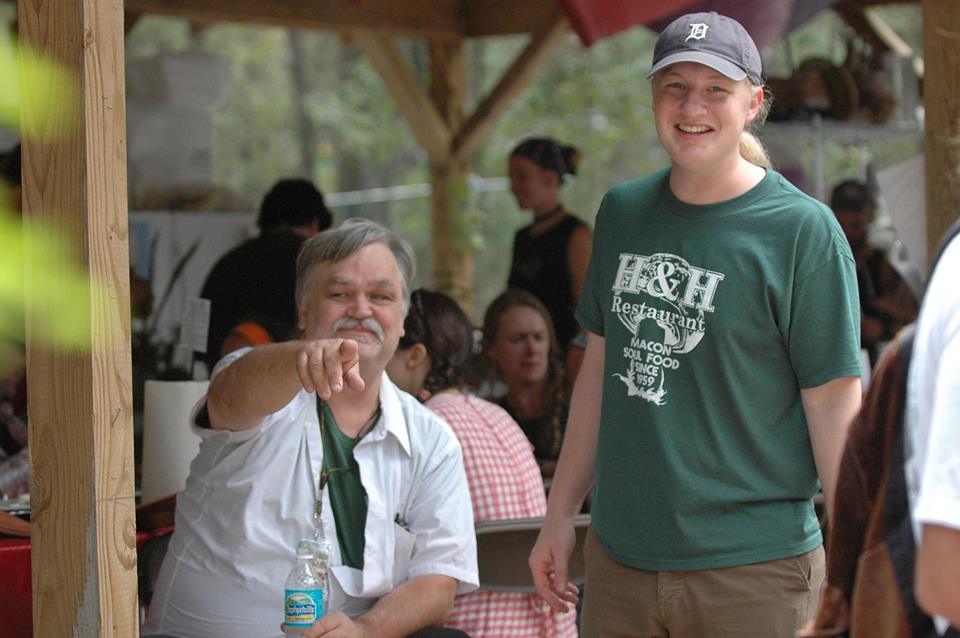
Kirk West captured the Col. and his young Lt. Derek.
…I moved to China. I formed a band with three Chinese musicians. We became popular, played all over Beijing, toured, recorded a CD. I sent it to Bruce. He texted me back: “Amazing. Call to explain how this all happened.”
I called. We talked.
…I saw Bruce at Warren’s Christmas Jam in 2014. He was playing with Bill Kreutzmann. “I’m the sane one in this band,” he whispered in my ear.
… When I began writing One Way Out in earnest in 2012 or 13. I wanted to interview Bruce, who was close to Duane. On my first reporting trip to Macon, he told me to meet him at Cluckers, a mediocre suburban Atlanta chicken joint near his house that was his main hang. I slid into a booth and as we both sipped iced tea, he looked me in the eye and asked a simple but important question:
“Are you really ready for this?”
“Yes.”
“Are you sure?”
“Yes.”
“You’re about to drive down a dark road, my friend, and you’re a person of the light. Be careful.”
If that sounds cinematic, it was. But that’s how things went with Bruce, which is why for all the tragedy of his death – and it is a crushing, deeply sad tragedy – it is also somehow in character. Head-scratchingly in character. Spend-the-rest-of-your-life-trying-to-figure-it-out in character. The mythmaker made his myth.
But know also that there are many people who lost a good friend today. That there are legions of musicians whose North Star is gone, who will now have to discover how to navigate the cold dark nights without him in the world. Know that Bruce has a lovely, saintly wife who made this all possible and who will miss her husband very much for a very long time.
Bruce Hampton was a musical and metaphysical light who burned incredibly brightly, who inspired so many. A man who never took the straight path but always arrived at the straight truth. I feel very lucky to have spent as much time with him as I did and very sad that it wasn’t more.
“Jessica” from Bruce70 – Derek, Warren, Chuck, Duane, Schools
ARU, 1992. Pretty good representation of what I heard and saw the first time.
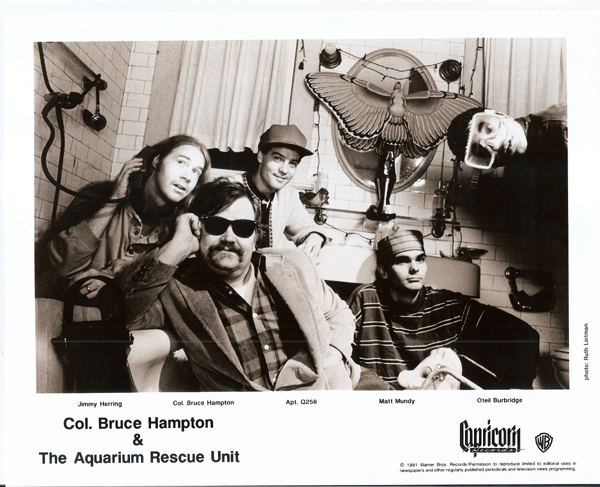
Early ARU photo – note pre-beard Jimmy Herring!
This story originally ran in Relix’ 40th Anniversary Issue.
In February 1992, the reunited Dixie Dregs were coming to New York’s Ritz and I was excited to check them out. Though I had always considered their music sterile if brilliantly constructed, I recognized Steve Morse as a brilliant guitarist. As a young Guitar World Managing Editor, I was anxious to expand my musical scope and appreciation and Steve was someone that I thought I should better understand. Publicist Mark Pucci pushed me to get there early to see the opening act, the oddly named Aquarium Rescue Unit
He assured me that the newly reformed Capricorn Records was very excited about the band, led by a longtime Atlanta cult hero, Col. Bruce Hampton (Ret.). Still pinching myself over living in New York City, working at a major music magazine and having publicists ask me to go to shows, I earnestly arrived at the Ritz close to starting time to check out this band with an open mind but with few expectations. They had just started when I walked in to the half-filed Midtown Manhattan ballroom and strolled right up to the lip of the stage, immediately astounded by what was unfolded.
A skinny redheaded guy with a beard was hunched over a Stratocaster, dispensing lightning fast licks that danced the razor’s edge I love, where everything could fall apart at any moment, though his sure-handed playing and obvious blues rooting made that highly unlikely. To his right, a handsome young man was grinning, eyes cast towards the sky as he worked a six-string bass with the same mix of skill and abandon, sometimes scatting along to the notes he played.
On the other side of the stage a dark haired guy with bushy eyebrows was blasting out supercharged bluegrass licks on a Mandocaster – a mandolin in the shape of a mini Telecaster. A brilliant drummer was laying down beats from enough angles to replicate at least two percussionists. Overseeing the whole thing was a crazy little man with a handlebar moustache playing some kind of demented short-scale instrument I would later learn he called a Chazoid. He sang like a bastard child of Bobby Bland and Hazel Dickens and occasionally played wicked, inspired licks. This was obviously the Colonel. He was clearly the ringmaster of this nutty circus, which radiated light and the spark of life and was hilarious without being a joke.
Questions bounced around my racing mind: Who was he? What was this? Why wasn’t everyone talking about this fabulous band? I pushed them all down and out because I wanted to stay in the moment, to drink deeply from this heady brew. I’d like to tell you how the rest of the crowd reacted, but I have no idea. I wasn’t looking around, solely focused on the stage, experiencing something that I have just a handful of times – musical nirvana that hit me in the head, heart and guts at the same time and was all the more powerful for being so completely unexpected.
After the show, I watched the musicians break down their own gear and got guitarist Jimmy Herring’s attention, introducing myself and telling him I’d meet him downstairs. I had been invited to a meet and greet, which I had originally planned on stopping by just long enough to see whether or not they had free beer, but my plans had changed.
In a little room downstairs, I chatted a bit with Bruce and spoke at length with Jimmy. We were both somewhat star struck – Jimmy was thrilled that a Guitar World editor had so enjoyed his playing. I was gob smacked that someone like him cared what I thought, and convinced that I had just discovered a major talent. I was right, of course, and as silly as Jimmy’s excitement seemed then and still seems now, it was revealing about both his nature and the group’s circumstances.
“We were making $92 a week and sleeping in one room,” Hampton told me recently. “After two years we got two rooms and we were so ecstatic we had a celebration. There were five of us in a Chevrolet van with 400,000 miles on it. How we did it, I’ll never know, but I never had more fun or made greater music than I did during that run.”
No wonder Jimmy was so happy that I had taken note of this brilliant musical circus; they were playing for love and for each other and I was an outsider acknowledging their instincts were right, that they were onto something. There is no greater satisfaction for an artist than some affirmation that their struggling is not for naught, something they had received precious little of outside their Atlanta base.
This group of five had been playing together for about two years. Bassist Oteil Burbridge and drummer Jeff Sipe (then called Apt. Q258) had been with Bruce for about three more years. Hampton originally hired Oteil as a drummer. “We played about three gigs and then he picked up the bass one day and I said, ‘That’s what you’ll be playing from now on,” Hampton says with a laugh. “He was a good drummer, but he was like the greatest bassist I had ever heard.”
All the musicians came to Hampton as virtuosos. He opened up their boundaries. Hell, he obliterated the very concept of boundaries.
“Old timers would tell me that Oteil was playing too much, but the song was always there,” says Hampton. “He never lost that. And he was 21 and full of this amazing energy, so why not let him be free? Then I told him, whatever he wanted to do, do the opposite.”
But isn’t that a contradictory concept – be free and do the opposite of what you want to do? “Yes!” says Hampton. “That’s it.”
If that contradiction makes perfect sense to you, then you are well on your way to understanding Hampton’s Zambi musical approach, which Burbridge sums up in a few words: “Bruce was our professor of out.”
The Colonel’s educational role was obvious, but to this day he cringes at being called a mentor, even after 20 more years discovering great young players.
“I learn as much from them as they do from me,” he says. “What made me unusual was that everyone my age had either quit or made it. No one was playing clubs and putting together new bands on the cheap like that.”
Hampton had been making music in Atlanta since the late 60s. His Hampton Grease Band drew the attention of Duane Allman, who became a friend and supporter and got the group signed to Capricorn, who sold the contract to Columbia. Hampton says that their 1971 album Music to Eat is the label’s second worst selling album ever. Hampton spent the next 20 years working on his own and with the Late Bronze Age until he started putting together the ARU.
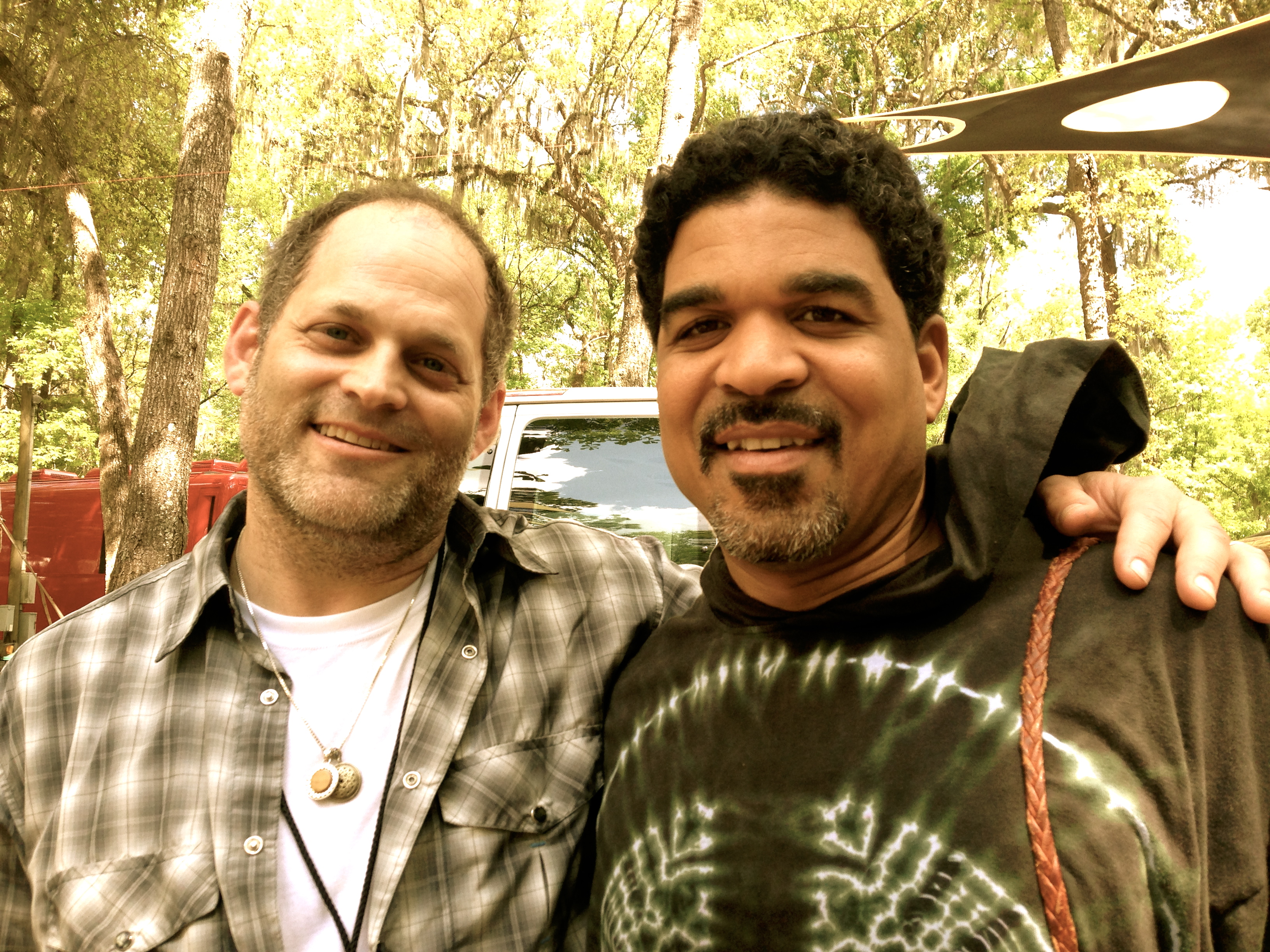
With Oteil at Wanee, 2014.
Hampton says that what he offered his young protégés was guidance. “They were already great when they joined the band, but what I did was try to break their boundaries,” he says. “I’d say, ‘Don’t be a fusion drummer or a blues bass player. Discover who you are.’ It was thrilling to discover all this together, and we went places that no one had ever been before – and very few people saw it.”
While their own shows may have rarely grown beyond large clubs, the ARU played on the early HORDE tours and became prime influences on the many bands and musicians, notably Phish, Widespread Panic and Derek Trucks, who was an honorary member by the time he could have been Bar Mitzvahed. The ARU were the jam band Velvet Underground; a group whose influence vastly overwhelmed their commercial success. Most of the members went on to make their marks: Oteil as bassist of the Allman Brothers Band since 1998; Herring with the Allmans, Phil Lesh and the Dead and now Panic; Sipe with a range of bands. Mundy quit the group suddenly in 1993, giving up music. He plays again, though not publicly. Hampton has consistently put together great new bands, including the Fiji Mariners and the Codetalkers. Nothing in his approach to music has really changed.
“You either leave essence or you don’t,” he says. “ You either capture the moment or you don’t and you know at every show if you missed it or hit it, but you don’t know when it’s coming or where it comes from. That elusiveness is what keeps all artists going. But in the ARU, I think we only had one or two bad gigs in four years. Every night it was on and we would push each other to the outer limits. We sometimes played six or eight-hour gigs for 99 cents admission. In other words, we were a mental illness group.”
Anyone who heard this brand of illness either fell in love or scratched his or her head and walked away. But even as the band was earning converts, they were cracking under the strain of the road. Mundy’s departure cost them more than a unique musical voice. “He was the glue,” says Hampton, who quit touring himself within a year. The band continued for a few years with a couple of different singers, before everyone started drifting off to other gigs. They have reunited for brief tours and one-off gigs over the years, most recently at last year’s Christmas Jam in Asheville, North Carolina.
At that first show, I eventually said good bye to Jimmy, who had to load his own gear onto a trailer and push on, and went back upstairs to hear the Dregs. The playing was spectacular, but I couldn’t quite focus on the music. It was exemplary but it existed in the known universe. That no longer seemed like quite enough.

